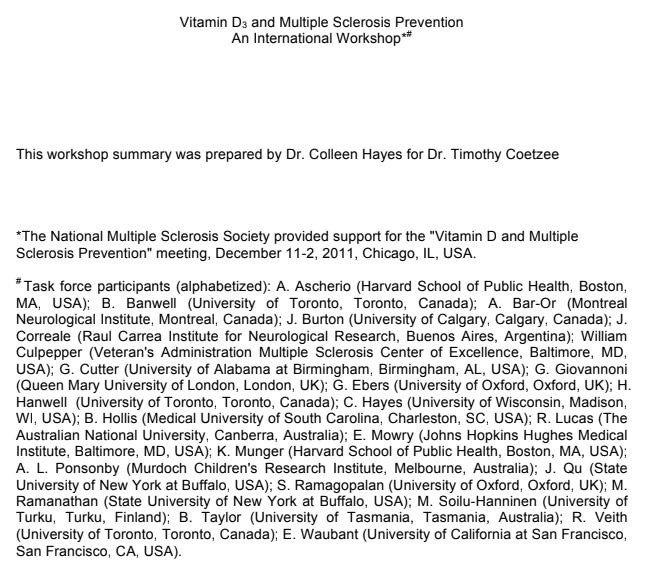It is argued that low vitamin D (vD) levels are a consequence of having multiple sclerosis, other autoimmune diseases (AIDs), or active inflammation in the case of infection. This is because active immune cells consume vD. Hence the low vD levels are not a cause or a risk factor for AIDs but a consequence. This is the so-called reverse causation theory.

I attended a National MS Society Vitamin D MS Prevention Task Force meeting in 2011 when we the MS community made a commitment to do a vD MS prevention study. We in fact designed three trials to take forward. Sadly nothing happened. If you are interested you can read the report of the International vD in MS Workshop, which I have uploaded to my filesharing site.
Why the lament?
The study below, albeit in older adults, suggests that a relatively modest daily supplemental dose of vD of only 2,000 IU/day reduced the risk of getting rheumatoid arthritis, polymyalgia rheumatic, autoimmune thyroid disease, psoriasis, and other AIDs by about 20%. Imagine if this study’s finding’s applied to MS? We could potentially prevent 20% of the next generation of people destined to get MS from ever getting MS. Sadly without hard data, we can’t extrapolate this study’s findings to MS. The main reason is this study was done in older people and targeted AIDs that occur in older people.
Despite my reservations, I do think low vD levels or lack of sun exposure are causally linked to MS. This is based on a large body of epidemiological evidence showing low levels of vD predict MS risk in the future and the fact genomic data from whole-genome associations studies and Mendelian randomisation studies show that genetic determinants of low vD levels are linked to an increased MS risk. It is for these reasons that I have been recommending to all my patients to make sure their family members, in particular, their children and siblings are vD replete. On the other side of the coin, vD supplementation is also very safe.
What about if you have MS already? Being vD replete is good for your bone health and as pwMS are higher risk of having osteopaenia or osteoporosis I think bone health is enough of a reason for taking vD supplements. I am aware that some neurologists and scientists think vD supplements may be disease-modifying, i.e. reduce the impact of MS on the nervous system and improve long-term disease outcomes. I am not convinced and remain doubtful that vitamin D makes much difference to MS outcomes. I do, however, stand to be corrected if larger well-designed studies show a robust disease-modifying effect of vD supplements.
Please note the current recommended daily allowance of vD is too low and is based historically on cod liver oil and rickets prevention. For immunological effects, you probably need an order of magnitude higher level of vD supplements.
My current recommendations for what dose of vD to take are the following:
0-2 years of age 600 IU/day
2-10 years of age 2,000 IU/day
>10 years of age 4,000 IU/day
My recommendations are based on the now-defunct vD Council’s and EFSA’s (European Food Safety Authority) recommendations on safe doses of vD.
In reality, we would probably supplement vD to a target blood level of between 100 and 250 nmol/L or between 40 and 100 ng/mL. This target is not based on population studies, but evolutionary medicine principles, i.e. what levels did our ancestors have and what levels do people who work outdoors in sunny environments maintain. However, it is difficult to justify doing repeat vD blood levels on a large number of people. So making recommendations as above is simply a pragmatic solution to an issue that affects the wider population.
Hahn et al. Vitamin D and marine omega 3 fatty acid supplementation and incident autoimmune disease: VITAL randomized controlled trial. BMJ . 2022 Jan 26;376:e066452. doi: 10.1136/bmj-2021-066452.
Objective: To investigate whether vitamin D and marine derived long chain omega 3 fatty acids reduce autoimmune disease risk.
Design: Vitamin D and omega 3 trial (VITAL), a nationwide, randomized, double blind, placebo controlled trial with a two-by-two factorial design.
Setting: Nationwide in the United States.
Participants: 25 871 participants, consisting of 12 786 men ≥50 years and 13 085 women ≥55 years at enrollment.
Interventions: Vitamin D (2000 IU/day) or matched placebo, and omega 3 fatty acids (1000 mg/day) or matched placebo. Participants self-reported all incident autoimmune diseases from baseline to a median of 5.3 years of follow-up; these diseases were confirmed by extensive medical record review. Cox proportional hazard models were used to test the effects of vitamin D and omega 3 fatty acids on autoimmune disease incidence.
Main outcome measures: The primary endpoint was all incident autoimmune diseases confirmed by medical record review: rheumatoid arthritis, polymyalgia rheumatica, autoimmune thyroid disease, psoriasis, and all others.
Results: 25 871 participants were enrolled and followed for a median of 5.3 years. 18 046 self-identified as non-Hispanic white, 5106 as black, and 2152 as other racial and ethnic groups. The mean age was 67.1 years. For the vitamin D arm, 123 participants in the treatment group and 155 in the placebo group had a confirmed autoimmune disease (hazard ratio 0.78, 95% confidence interval 0.61 to 0.99, P=0.05). In the omega 3 fatty acids arm, 130 participants in the treatment group and 148 in the placebo group had a confirmed autoimmune disease (0.85, 0.67 to 1.08, P=0.19). Compared with the reference arm (vitamin D placebo and omega 3 fatty acid placebo; 88 with confirmed autoimmune disease), 63 participants who received vitamin D and omega 3 fatty acids (0.69, 0.49 to 0.96), 60 who received only vitamin D (0.68, 0.48 to 0.94), and 67 who received only omega 3 fatty acids (0.74, 0.54 to 1.03) had confirmed autoimmune disease.
Conclusions: Vitamin D supplementation for five years, with or without omega 3 fatty acids, reduced autoimmune disease by 22%, while omega 3 fatty acid supplementation with or without vitamin D reduced the autoimmune disease rate by 15% (not statistically significant). Both treatment arms showed larger effects than the reference arm (vitamin D placebo and omega 3 fatty acid placebo).
Subscriptions
As you are aware I am raising funds from paid subscriptions to administer the MS-Selfie Newsletter and associated MS-Selfie microsite that is currently in development. So if you are an active paying subscriber thank you, your contribution is much appreciated. Please note the money raised via subscriptions is being used to pay a professional medical writer to curate, rewrite and transfer the contents of the Newsletter onto a companion MS-Selfie microsite, which is being designed and maintained by a freelance web designer. So if you find these Newsletters helpful and want the wider MS community to continue to have access to all content I would encourage you to become a paid subscriber. Thank you.
General Disclaimer: Please note that the opinions expressed here are those of Professor Giovannoni and do not necessarily reflect the positions of Barts and The London School of Medicine and Dentistry nor Barts Health NHS Trust. The advice is intended as general advice and should not be interpreted as being personal clinical advice. If you have problems please tell your own healthcare professional who will be able to help you.
















Share this post